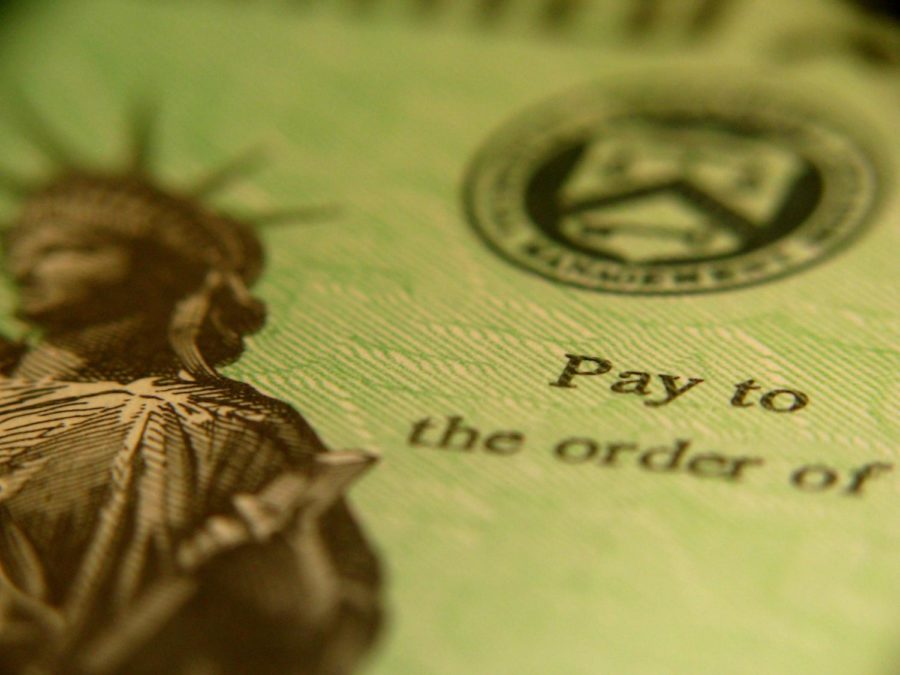Bailout will see some Americans receive checks from government
March 29, 2020
A $2 trillion dollar bipartisan stimulus bill named the CARES Act was signed by President Donald Trump on March 26, the largest stimulus bill in U.S. history, with the goal of addressing the ongoing economic decline due to the COVID-19 pandemic.
“Americans can see that President Trump is out front and leading the country in the battle against the coronavirus,” Trump 2020 campaign manager Brad Parscale said in a press release. “With his signing of the CARES Act, Americans will get the relief they need as they fight through this crisis. President Trump is both protecting the health and safety of our citizens and safeguarding our economy at the same time.”
According to data from John Hopkins University, the U.S. had more than 124,000 cases of the disease and at least 2,191 deaths resulting from it as of early March 29, and around 3.3 million Americans filed for unemployment in one week, according to Department of Labor statistics.
The relief package Trump signed delivers some Americans a one-time payment, implements additional health insurance measures, strengthens unemployment insurance and offers loans and grants to businesses to deter layoffs.
Zack Bonner, lecturer of political science, said he was not surprised to see the bill pass 96-0 in the Senate.
“Right now, to have any member of Congress say no to something that is really going to greatly help the American economy and the American people in general, I don’t think anyone really wants to vote against that right now,” Bonner said.
The bill will send a direct payment of $1,200 dollars to Americans earning an income of up to $75,000 and an additional $500 per child. Payments continue to range based on marital status and increased income. CNBC developed a calculator individuals can input information into to determine how much of a check they could expect.
Some Americans are not eligible for any money, though. Some adults, such as some college students, will not receive anything if they are claimed as a dependent on tax returns by others, and Americans earning more than $99,000 on their own or $198,000 as a couple are not eligible for a check either.
Airlines will receive nearly $60 billion in loans that prohibit stock buybacks with a promise they will not layoff or furlough their employees until Sept. 30. Bonner said due to the airline industry taking such a large hit, he does think they need assistance, but the American people should come first.
“Overall, I am not sure I agree with as much as they are getting, but I don’t fully understand a lot of the dynamics behind why they are getting the amount they do,” Bonner said. “One of the biggest things, outside the American people, in case they get a furlough or lose their job, is making sure they are taken care of. I also think funding for hospitals and community clinics needs to be much higher in that package.”
Iowa will receive $1.25 billion to reimburse the state for some of the costs of COVID-19. Nationally, the CARES Act delegates $100 billion for hospitals and health centers, $350 billion in small business loans and $30 billion in education funding, according to a press release released by Rep. Cindy Axne, D-West Des Moines.
In an email to the Daily, Ryan Hurley, president of the College Republicans and sophomore in pre-business, said he was overall impressed with the bill.
“I thought this was a great idea to help Americans in need,” Hurley said. “[I] was very much upset at [Nancy] Pelosi and other Democrats trying to insert nonsensical unrelated things into the bill. I feel the Trump administration has handled the situation well.”
The College Democrats at Iowa State did not reply to a request for comment.
Bonner said the CARES Act is a short-term solution to boost the economy.
“I don’t think this is a final solution by any means,” Bonner said. “I think this is what they termed emergency relief more than anything because really, if you look into the unemployment benefits they are extending for the American people, that only goes I believe 13 weeks, so three or four months, so it is not a permanent solution. It is just trying to prop up the economy while there is so much unknown with how this virus is going to continue to increase over time.”
Bonner said he expects there to be more bills passed as the pandemic continues.
“I don’t think this is the end by any means,” Bonner said. “I think this is just one of the first steps that they will have to undertake.”

















